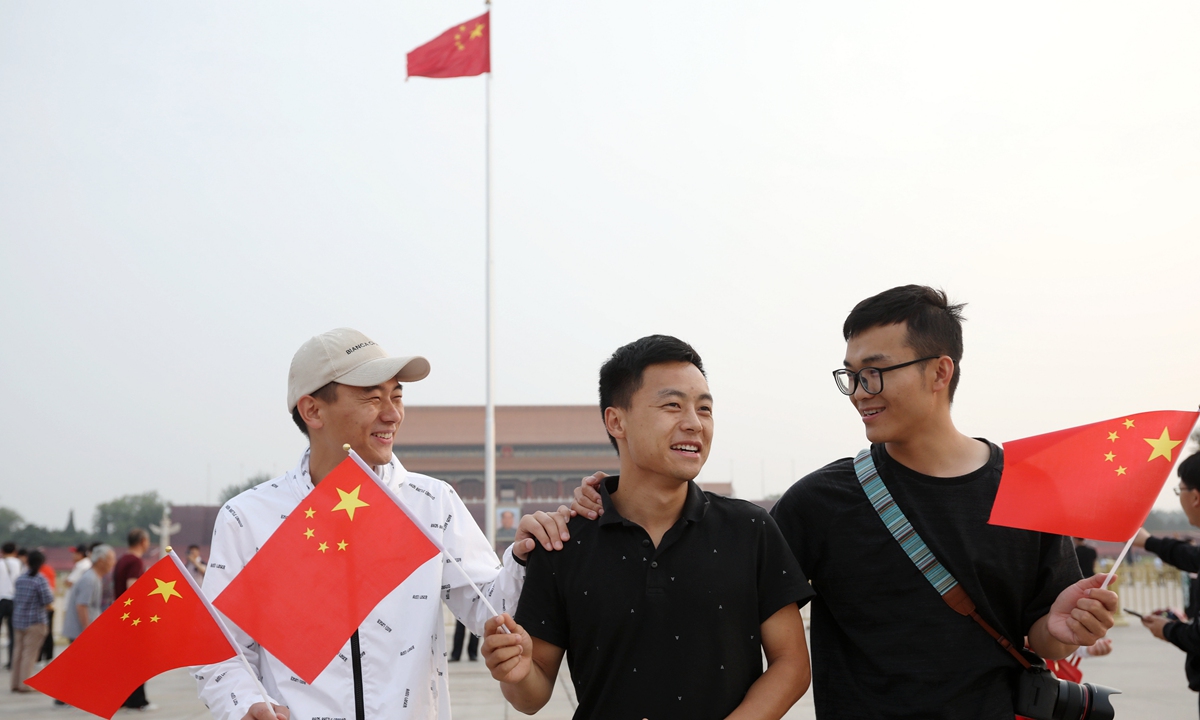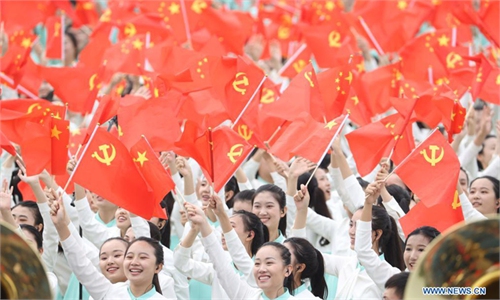
Three men hold Chinese national flags at Tiananmen Square in Beijing on Tuesday after the flag-raising ceremony. Photo: Cui Meng/GT
Editor's Note:May 4th marks the Youth Day in China. This year also marks the 100th anniversary of the founding of the Communist Youth League of China. This generation of Chinese youths not only have more opportunities than their predecessors, but have interacted more with their peers elsewhere across the world. For this reason, their confidence and faith will have a profound influence around the world. The Global Times has invited several international observers to comment on their impression of this generation of Chinese youths. This is the fifth article in the series.
May 4th is a significant date in China. It signifies the anniversary of the May Fourth Movement in 1919. It was following the end of World War I in Europe that Western allies imposed the Treaty of Versailles on Germany, forcing it to cede its overseas dominions as punishment for the conflict. Despite China, however, having helped Britain and France significantly throughout the war, German-occupied territories in Shandong Province was not given back to China with the treaty, but handed over to Japan.
This provoked the May Fourth Movement, a generation of young people who were angry at China's betrayal by the West and the weakness of their leaders to stand up for their country and to sufficiently develop it into a modern and sovereign nation.
It led to an outpouring of nationalism and soul searching throughout the country, of which soon led to the creation of the Communist Party of China. Contemporary historians understand the events of May 4th as a turning point in the country's history, a time whereby an idealistic and patriotic young generation rose up to shape its future.
Over 100 years later. China has come a long way, but again faces another inflection point concerning its relationship with the West. Once again, the West is showing ill intentions toward China. Once having courted the country, they now see it as a geopolitical adversary to be contained with politicians and media promulgating a campaign of hatred and paranoia against it, a public opinion war which has been unprecedented in scope. This has involved scapegoating it for the COVID-19 pandemic, undermining its national sovereignty in regards to Hong Kong and Taiwan, groundlessly accusing it of acts such as genocide, inciting fear and hysteria over Chinese technology, investments and much more, all with the goal of attempting to contain its rise.
These developments have had a profound effect on the attitudes of Chinese young people. Once having looked up to the West as a role model, admiring its culture and way of life, and being more "liberal" in their disposition, they now see hatred, bitterness and resentment toward their country for daring to make progress. The campaign of unprovoked hatred against China has produced a new wave of patriotism and support for China's own domestic political system and future. In other words, it has had a "rallying effect" around their country and the ruling Communist Party like never before, recognizing that their choice is to either support and back a rising China, or to accept subservience to a West which refuses to respect it on equal terms and is determined to politically and economically dominate it.
In the true spirit of the May Fourth Movement, the young people of China are rejecting an attempt by the West to impose a new "century of humiliation" upon them, but are nonetheless confident about their country's future.
They recognize that China has made great strides in development across the past 50 years, that the Communist Party has delivered for ordinary people and that their country is experiencing a renaissance and becoming stronger and more prominent in the world. As a result, they perceive that the negative attitude from the West is a reaction to this success, a projection of insecurity stemming from a fear of losing status. Young Chinese people see a West which is suffering from political and economic decline, and struggling to compete with a rising China.
Over the past few years, Chinese youths have watched how China successfully overcame its COVID outbreaks whilst the responses of Western countries ended in catastrophe.
They have observed how China's economy has continued to grow and offset challenges, whilst Western countries have fallen into crisis after crisis. Likewise, it has not gone unnoticed how the legacy of individuals such as Donald Trump in the US, or Boris Johnson in Britain has exposed the flaws and decay of Western liberal democracy, all of which has strengthened their resolve in China's own model in the midst of the backlash against it.
As a result, this is an optimistic and forward-looking time for young people in China. Their country is at a crossroads once again, facing opposition, betrayal and bad faith politics from the West. Yet unlike the May Fourth Movement, this is not a time of weakness, disarray or humiliation for China, but it is a time of strength, confidence and hope in the future. Increasingly patriotic, the young people of China are putting their faith in the reality that their country will prevail and deliver against the challenges it faces, and they are heeding the rallying cry to offset the West in its bid to contain their nation. They do not believe they need Western style liberal democracy, and that China's own model will be the way forward.
The author is a political and historical relations analyst. opinion@globaltimes.com.cn


